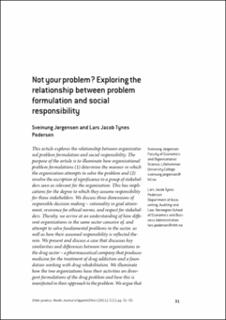| dc.contributor.author | Jørgensen, Sveinung | |
| dc.contributor.author | Pedersen, Lars Jacob Tynes | |
| dc.date.accessioned | 2020-11-26T08:00:49Z | |
| dc.date.available | 2020-11-26T08:00:49Z | |
| dc.date.created | 2011-05-10T11:34:52Z | |
| dc.date.issued | 2011 | |
| dc.identifier.citation | Etikk i praksis. 2011, 5 (1), 31-50. | en_US |
| dc.identifier.issn | 1890-3991 | |
| dc.identifier.uri | https://hdl.handle.net/11250/2689673 | |
| dc.description | This journal provides immediate open access to its content on the principle that making research freely available to the public supports a greater global exchange of knowledge. No subscription fees are charged to readers. | en_US |
| dc.description.abstract | This article explores the relationship between organizational problem formulation and social responsibility. The purpose of the article is to illuminate how organizational problem formulations (1) determine the manner in which the organization attempts to solve the problem and (2) involve the ascription of significance to a group of stakeholders seen as relevant for the organization. This has implications for the degree to which they assume responsibility for those stakeholders. We discuss three dimensions of responsible decision making – rationality in goal attainment, reverence for ethical norms, and respect for stakeholders. Thereby, we arrive at an understanding of how different organizations in the same sector conceive of, and attempt to solve fundamental problems in the sector, as well as how their assumed responsibility is reflected therein. We present and discuss a case that discusses key similarities and differences between two organizations in the drug sector – a pharmaceutical company that produces medicine for the treatment of drug addiction and a foundation working with drug rehabilitation. We illuminate how the two organizations base their activities on divergent formulations of the drug problem and how this is manifested in their approach to the problem. We argue that this ultimately translates into differences in the inclusion of various stakeholders in their problem space, and thereby the degree to which they assume responsibility for key stakeholders. This contributes to the corporate social responsibility literature by providing an in depth account of how problem formulations shape organizational activities and determine the practical inclusion of stakeholders’ interests in the decisions and activities of organizations. | en_US |
| dc.language.iso | eng | en_US |
| dc.rights | Navngivelse 4.0 Internasjonal | * |
| dc.rights.uri | http://creativecommons.org/licenses/by/4.0/deed.no | * |
| dc.subject | corporate social responsibility | en_US |
| dc.subject | decision making | en_US |
| dc.subject | problem formulation | en_US |
| dc.subject | stakeholder management | en_US |
| dc.title | Not your problem? Exploring the relationship between problem formulation and social responsibility | en_US |
| dc.type | Peer reviewed | en_US |
| dc.type | Journal article | en_US |
| dc.description.version | publishedVersion | en_US |
| dc.subject.nsi | VDP::Samfunnsvitenskap: 200 | en_US |
| dc.source.pagenumber | 31-50 | en_US |
| dc.source.volume | 5 | en_US |
| dc.source.journal | Etikk i praksis | en_US |
| dc.source.issue | 1 | en_US |
| dc.identifier.doi | 10.5324/eip.v5i1.1732 | |
| dc.identifier.cristin | 804499 | |
| cristin.unitcode | 209,6,4,0 | |
| cristin.unitname | Institutt for organisasjon, ledelse, styring | |
| cristin.ispublished | true | |
| cristin.fulltext | original | |
| cristin.qualitycode | 1 | |

